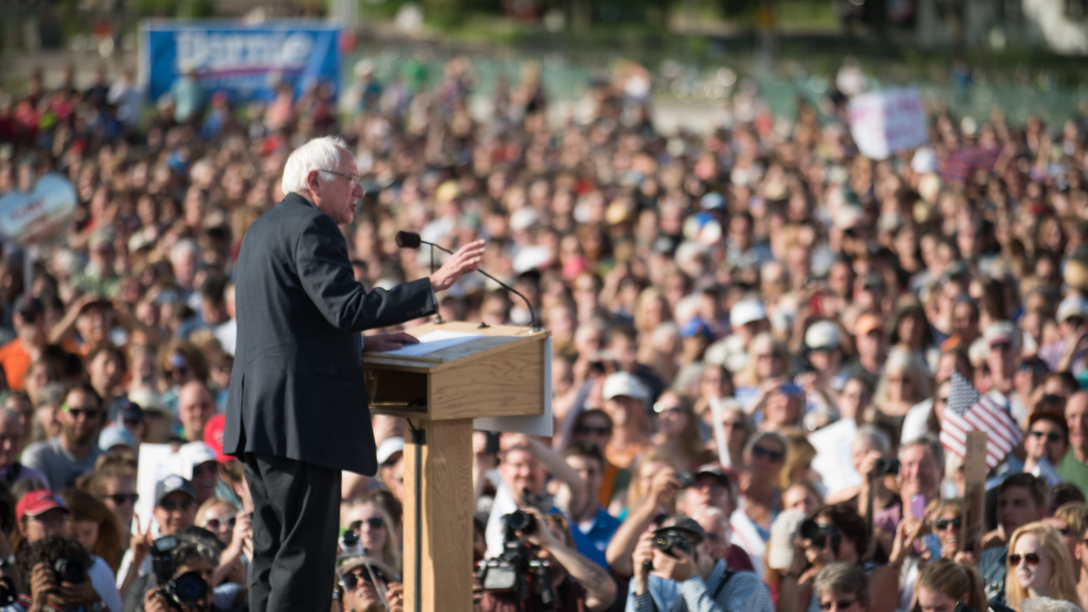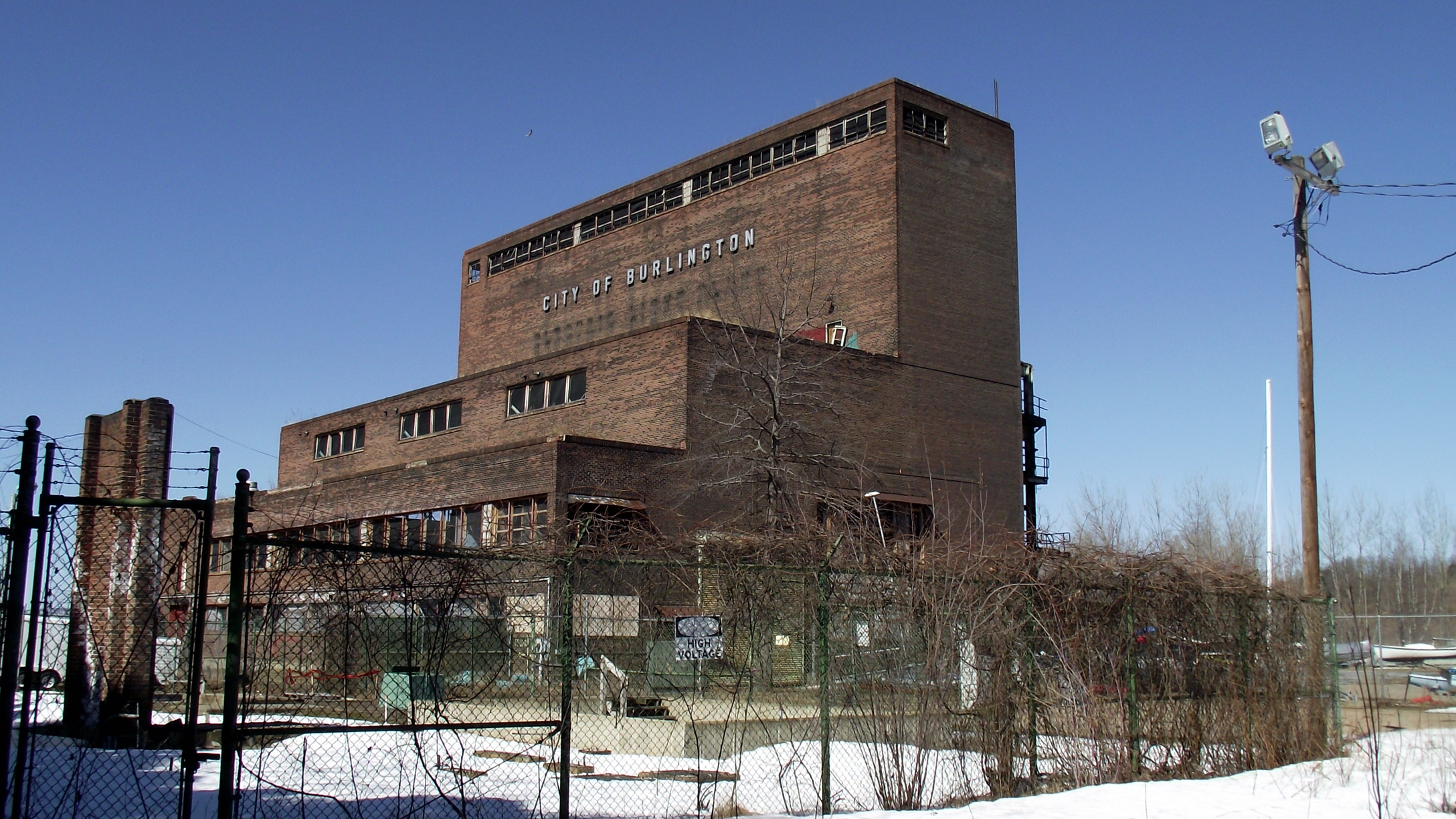There is an abandoned power plant on the lakeshore of Burlington, Vermont, steeped in asbestos and other such poisons. The city has been trying to tear it down for three decades. Each year, it seems, a futile new plan surfaces to finally demolish the place. But the Moran plant is stubborn. It hulks. It accumulates mold and graffiti. Burlington’s endless quest to scrub itself of its coal-ridden industrial past ends, or rather never quite ends, here.
When Bernie Sanders first ran for mayor in 1981, scraping a 10-vote victory over a five-term incumbent, his de facto slogan was “our waterfront is not for sale.” At the time, opulent high-rises had been slated for construction on the lakeshore. True to Sanders’s promise, that stretch of land is now a public space—one where I attended sprawling bluegrass concerts, and loitered with teenage loves.
It was here, too, that Sanders announced his 2016 presidential campaign. The Burlington waterfront was his first battlefield and his first triumph, the crowning glory of the city’s progressive movement, with only the Moran left standing to remind us of a time before Sanders, before a new politics swept through the city.
Sanders campaigned in 2016 for an electoral revolution — an oxymoron, certainly, but one that had already played out in the state of Vermont. For decades, progressives here have tackled impossible elections and won. Somehow, Burlington has remained an unflinching bastion of progressive politics since Reagan took office, even as third-party voting was declining nationally. The movement slowly crept across the state; no wonder Sanders is convinced it can reach the rest of the nation.
Progressivism in Vermont is formalized and widespread. Though it claims Sanders as a sort of celebrity figurehead, the Vermont Progressive Party is an entity all its own. Its success as a third party is unparalleled in 21st-century U.S. politics. At present there are only two third parties in the United States that hold state office: The Vermont Progressives, with nine state legislators, and New York’s platform-less Independence Party, which has one. The Libertarian party has a higher voter registration count, but has had far fewer members elected to state office, instead putting its efforts to far-fetched national races. Vermont, here, is a stunning anomaly.

Bernie Sanders left city politics 31 years ago. Since then, Burlington has had two more progressive mayors, their terms spanning two decades. The current mayor is a moderate, but progressives clinched the city council in April. If there’s a prevailing sense nationally that the end of Sanders’s campaign dealt a blow to the progressive movement, that’s not so in Burlington.
For Burlington city councilor Brian Pine, a longtime progressive, political organizing has morphed into hotel management. The Holiday Inn outside the city has been converted into a recovery center for coronavirus patients who lack stable housing, and Pine is running the hotel. He is fighting, as he has for the past three decades, the lack of affordable housing that plagues Burlington. “In spite of all our great efforts, we could probably write the same report on the condition of our housing as that done in the 80s,” he told me. “And it’s really frustrating.”
In 1984, Burlington became the first city in the country to fund a community land trust. This was one of Sanders’s more radical projects, provoking anxious mutters of a communist takeover among Burlington’s upper crust. There are hundreds of such land trusts in U.S. cities now; Burlington’s is the largest in the country, and it owns thousands of apartments in Burlington and nearby counties. Yet rents are still climbing.
It’s hard to describe how popular Bernie Sanders is in Vermont. We have few celebrities, to be sure: the band Phish comes in a close second, alongside the Ben & Jerry’s founders. I’ve lost count of the conversations I’ve had with staunch Burlington conservatives who reel off opinions in perfect opposition to Sanders’s policy stances—and who go on to say: “Oh, but of course I support Bernie. It’s different.”
Bernie Sanders arrived in Vermont as an out-of-towner, part of the wave of leftists and hippies who migrated to Burlington in the 70s and 80s, drawn by the university, fleeing the collapse of Woodstock Nation and nettling Burlington’s more traditional residents. Under the long shadows of IBM and General Electric, the city’s dominating employers, anarchist newspapers were circulating and workers were organizing.
William Conroy, a Ph.D student at Fordham, was intrigued by the Sanders regime in 80s Burlington and by the “Sanderistas,” as his supporters were known, and spent some years writing a book on Sanders’s time as mayor. Conroy concluded that Sanders had run the city well, cementing himself in national headlines as “the socialist mayor,” but failed to implement much structural change.
The image of Sanders that emerges from Conroy’s book is that of a clever and dogged leader. Deadlocked by the opposition of the establishment and the limitations of city politics, Sanders spoke often of his lofty ideals and cut deals with developers afterwards. He stood with General Electric workers when anti-war demonstrators blocked off the entrance to the plant in protest of GE’s arms sales in Central America. You could call hypocrisy if you want, but I know this is why Sanders is loved so deeply in Vermont.
Conroy is a retired professor living in rural Kentucky now. He explained to me tiredly that Sanders can’t solve the problems he wants to solve until the constitution is rewritten. He’s shocked by Sanders’s success. “I never would have guessed in a billion years that this guy would’ve been very close to the Democratic nominee for president,” he said. “I could say, oh, I knew it back then, but that [would be] total bullshit. I never, never would have guessed that.”
Post-Sanders, the debris of decades of political struggle is now scattered about the city of Burlington. There is bustling City Market, Burlington’s community- and worker-owned grocery store, with 14,000 members; also the offices of Burlington Telecom, the city’s failed attempt at a publicly-owned telecommunications service that mired Burlington in a $33 million lawsuit for improper spending. Arrays of solar panels have replaced the old power plant, gathering up sunlight so that Burlington can run on renewables.
And at the city’s center, there is a six-acre pit—yes, an open pit—that marks the site of a long-delayed development project that progressives failed to stop. Predictably, the plans ran aground. It looks, now, like an asteroid hit the city.
In April, Burlington’s progressives retook the city council, several of them unseating old Democratic incumbents, riding the dissatisfaction that is plaguing the Democrats following the pit and other scandals. They are all young; many are shimmering idealists. In photos, they beam, dressed in flannels and Bernie apparel like a cartoon cast of Vermonters. Already, newcomer Perri Freeman has drawn contemptuous national headlines for calling to disarm Burlington’s police force. Already, older Burlington residents have grumbled to me that this new crop of progressives is far out of touch, that their clamoring idealism and dedication to creating new bike lanes is irritating.
If you grew up in Burlington, sneaking out to climb the Moran power plant was a rite of passage. We were all desperate for the adolescent glory of gazing out at the city from on high. From that vantage, the town is small and fragile, a wavering reflection in the lake below. It all might be toppled by the wind blowing in from the mountains.
Some part of me will be sad when the Moran is razed at last. It’s slated to be, this summer, or so the city promises.






